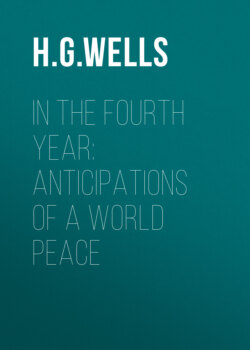Читать книгу In the Fourth Year: Anticipations of a World Peace - H. G. Wells - Страница 4
На сайте Литреса книга снята с продажи.
H. G. WELLS.
ОглавлениеTable of Contents
May, 1918.
It is a dangerous thing to recommend specific books out of so large and various a literature as the “League of Nations" idea has already produced, but the reader who wishes to reach beyond the range of this book, or who does not like its tone and method, will probably find something to meet his needs and tastes better in Marburg’s “League of Nations,” a straightforward account of the American side of the movement by the former United States Minister in Belgium, on the one hand, or in the concluding parts of Mr. Fayle’s “Great Settlement” (1915), a frankly sceptical treatment from the British Imperialist point of view, on the other. An illuminating discussion, advocating peace treaties rather than a league, is Sir Walter Phillimore’s “Three Centuries of Treaties.” Two excellent books from America, that chance to be on my table, are Mr. Goldsmith’s “League to Enforce Peace” and “A World in Ferment” by President Nicholas Murray Butler. Mater’s “Sociiti des Nations” (Didier) is an able presentation of a French point of view. Brailsford’s “A League of Nations” is already a classic of the movement in England, and a very full and thorough book; and Hobson’s “Towards International Government” is a very sympathetic contribution from the English liberal left; but the reader must understand that these two writers seem disposed to welcome a peace with an unrevolutionized Germany, an idea to which, in common with most British people, I am bitterly opposed. Walsh’s “World Rebuilt” is a good exhortation, and Mugge’s “Parliament of Man” is fresh and sane and able. The omnivorous reader will find good sense and quaint English in Judge Mejdell’s “Jus Gentium,” published in English by Olsen’s of Christiania. There is an active League of Nations Society in Dublin, as well as the London and Washington ones, publishing pamphlets and conducting propaganda. All these books and pamphlets I have named happen to lie upon my study table as I write, but I have made no systematic effort to get together literature upon the subject, and probably there are just as many books as good of which I have never even heard. There must, I am sure, be statements of the League of Nations idea forthcoming from various religious standpoints, but I do not know any sufficiently well to recommend them. It is incredible that neither the Roman Catholic Church, the English Episcopal Church, nor any Nonconformist body has made any effort as an organization to forward this essentially religious end of peace on earth. And also there must be German writings upon this same topic. I mention these diverse sources not in order to present a bibliography, but because I should be sorry to have the reader think that this little book pretends to state the case rather than a case for the League of Nations.
